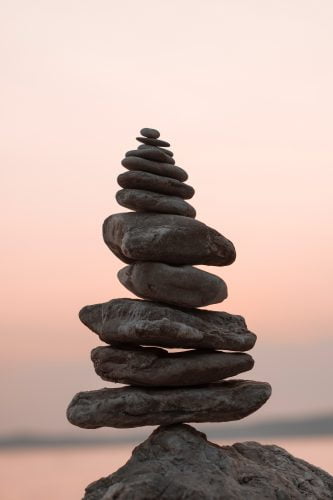 Several years ago I heard a tv special in which TV actress Jane Fonda said this about life: "We are not meant to be perfect. We are meant to be whole."
Several years ago I heard a tv special in which TV actress Jane Fonda said this about life: "We are not meant to be perfect. We are meant to be whole."
Hearing it was one of those stop me in my tracks kind of moments because what truth!
And being whole is not about: "Bam! Now I've got my stuff together" but rather a really long journey. In my faith tradition, we call this spiritual formation.
Yet, how much of our lives do we live striving for perfection?
A diet the starves us. A succession plan at work that enslaves us. And, keeping a pristine yard that exhausts us. 
And not only this. Some of us won't go out of our house without our make-up.
We don't say what is troubling us in the church prayer request time or even around the table at lunch with girlfriends.
And as a result, sure, we might look good in public and be the envy of others for our wonderful lives. But, perfectionism costs us something. Here are 4 things:
I can smell a fake 50 feet away, can't you? I don't respect (or follow for that matter) people who aren't telling the truth.
Fakers are not those who make it to the top in the very end.
Fakers are not the friends you call in the middle of the night when you need a friend. Fakers are not the ones who are cared for in community when life hits it most rocky patches.
In the race toward perfection we begin to "see ourselves more highly than we ought" as Paul warns against in the book of Romans.
You know those perfect friends of yours who always have the best plan for how to make their spouse do exactly what they want to do on Friday night, or how to start potty training their child at 18 months old, or who achieve the highest percentage of weight loss in only a month?
And what is worse is they don't even see it.
Sure, there are times when out of the norm things happen that are wonderful, but to be human is to NOT have your surroundings exactly aligned as if we were in charge of our own universe. We all have bad luck sometimes.
Those who are in the rat race to be perfect, often don't have the time for others. These folks don't have time to stop and help a co-worker.
They don't have time to consider the recent losses experienced by a friend.
Friends like this don't have time to simply sit with a person through long-term crisis.
Why?
Because all of these things slow a perfectionist seeker down.
And not only this, I don't know how many times that people have said to me as a pastor, "I'd wish could help ____ who needs help but I can't. I'm not sure I would know what to say or do." Perfectionism often paralyzes us from what could be human to human encounters of love.
Brene Brown has become the queen of talks about vulnerability. Her book The Gift of Imperfection became a national best seller (if that tells you anything about American culture and what we most crave).
She says this about vulnerabilities' gifts for us: “Owning our story can be hard but not nearly as difficult as spending our lives running from it.
Embracing our vulnerabilities is risky but not nearly as dangerous as giving up on love and belonging and joy—the experiences that make us the most vulnerable.
Only when we are brave enough to explore the darkness will we discover the infinite power of our light.”
Show more of your warts today!
 I grew up in an evangelical, Bible-belt household.
I grew up in an evangelical, Bible-belt household.
I was taught that females shouldn't lead churches (though being international missionaries was ok-- out of sight out of mind).
I was taught that being gay was a sin. I was taught that the Bible was the infallible word of God. To be angry with how Paul referred to women was disrespectful.
To be a good Christian, I needed form myself into this mold. And who doesn't want to be good?
Being a good Christian was about following rules. Being a good Christian was about doing good to others, especially those who had not yet prayed the sinner's prayer of forgiveness (because maybe one day you could lead them to faith). Being a good Christian was about keeping your life close to those who believed just like you-- for to spend too much time with those who were not Christians could pollute your own relationship with Jesus.
For many years, I did well at this gold star obtaining way of faith. I read my Bible a lot. I went to church a lot. And I even tried to evangelize my unsaved friends (you know who you are).
But what happens when a girl like this grows up and begins to ask questions?
What happens when a girl like this has a moment one day on a mission trip wondering what in the heck she is doing trying to force a 7-year-old in a park to ask for forgiveness of sins?
What happens when a girl like this has a calling to actually LEAD a church (and the gifts and education to do so)?
What happens when a girl like this meets some of the most Jesus loving people she's ever met who happen to be gay too?
I guess there were two choices.
1) Become disillusioned to the whole Jesus thing saying Christians were stupid and I wanted no part.
2) Seek out a path of different kind of Christianity, even if it might leaving behind the church that raised me and my most familiar tradition behind.
Obviously I chose the second path.
Without shame, I took preaching classes at seminary, sought out a job that would allow me to preach and became ordained.
I read scripture with an open mind and have continued to do so.
I led a church that welcomed all kinds of people-- those in AA, those with criminal records, those who were gay, soccer moms with drug problems and even me, a pastor with more questions than answers. (Because we are all really broken in some way).
And here's my current challenge: I find myself as a "Preacher on the Plaza" (i.e. a pastor without a church) where the powers that be around me would love me to bow down and become more "that kind of Christian."
Don't I know my place? Couldn't I be more submissive? Shouldn't I be more accepting of those who who might just need more time to be more loving?
I can't, my friends. I can't.
I can't because I believe the love of God is wider than we could ever imagine.
I can't because I believe this world needs voices louder those of Christian majority-- voices that embrace before they judge.
I can't because I believe that revelation of God is finished; we're all a part of a living and active story.
The best is yet to be! And I want to be a part of it. I want to be a pastor to those who have been hurt by the church and its messages the most.
So, here I stand as not that kind of Christian. But a Christian nonetheless.